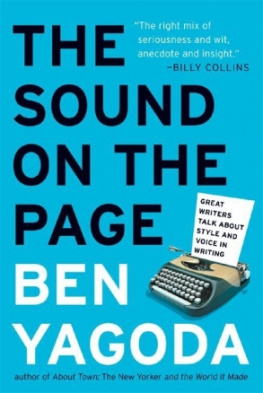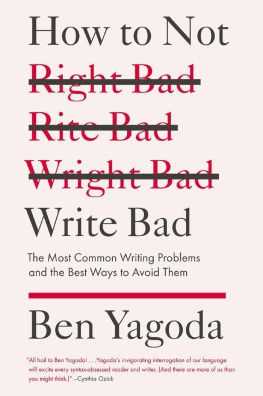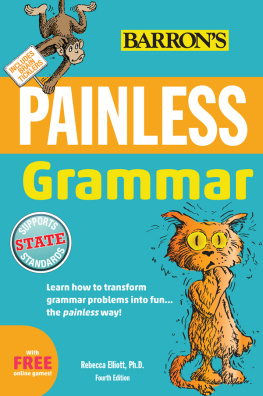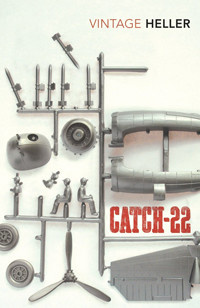Ben Yagoda - When You Catch an Adjective, Kill It: The Parts of Speech, for Better And Or Worse
Here you can read online Ben Yagoda - When You Catch an Adjective, Kill It: The Parts of Speech, for Better And Or Worse full text of the book (entire story) in english for free. Download pdf and epub, get meaning, cover and reviews about this ebook. year: 2007, publisher: Broadway, genre: Art. Description of the work, (preface) as well as reviews are available. Best literature library LitArk.com created for fans of good reading and offers a wide selection of genres:
Romance novel
Science fiction
Adventure
Detective
Science
History
Home and family
Prose
Art
Politics
Computer
Non-fiction
Religion
Business
Children
Humor
Choose a favorite category and find really read worthwhile books. Enjoy immersion in the world of imagination, feel the emotions of the characters or learn something new for yourself, make an fascinating discovery.

- Book:When You Catch an Adjective, Kill It: The Parts of Speech, for Better And Or Worse
- Author:
- Publisher:Broadway
- Genre:
- Year:2007
- Rating:4 / 5
- Favourites:Add to favourites
- Your mark:
- 80
- 1
- 2
- 3
- 4
- 5
When You Catch an Adjective, Kill It: The Parts of Speech, for Better And Or Worse: summary, description and annotation
We offer to read an annotation, description, summary or preface (depends on what the author of the book "When You Catch an Adjective, Kill It: The Parts of Speech, for Better And Or Worse" wrote himself). If you haven't found the necessary information about the book — write in the comments, we will try to find it.
Ben Yagoda: author's other books
Who wrote When You Catch an Adjective, Kill It: The Parts of Speech, for Better And Or Worse? Find out the surname, the name of the author of the book and a list of all author's works by series.
When You Catch an Adjective, Kill It: The Parts of Speech, for Better And Or Worse — read online for free the complete book (whole text) full work
Below is the text of the book, divided by pages. System saving the place of the last page read, allows you to conveniently read the book "When You Catch an Adjective, Kill It: The Parts of Speech, for Better And Or Worse" online for free, without having to search again every time where you left off. Put a bookmark, and you can go to the page where you finished reading at any time.
Font size:
Interval:
Bookmark:
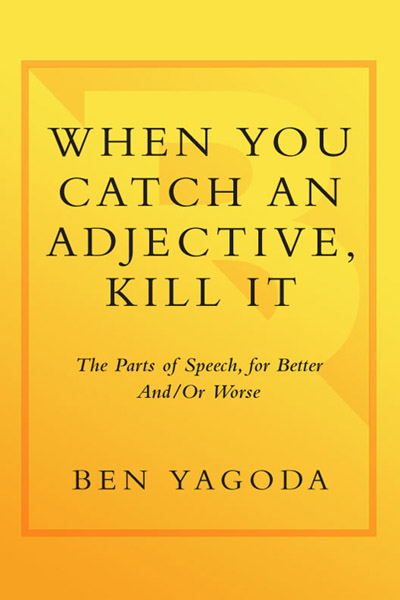
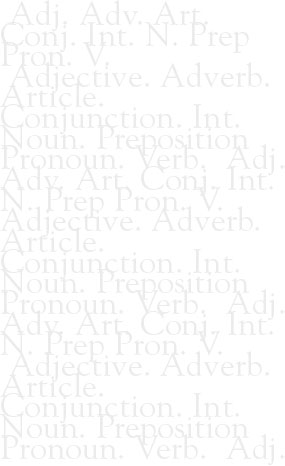
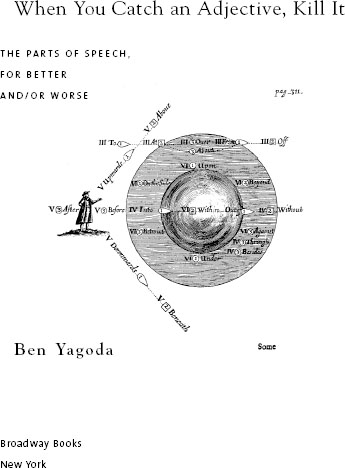
contents
To Elizabeth Yagoda and Maria Yagoda
my ears on the ground
acknowledgments
The leadoff spot has to go to Geoffrey Pullum, who unaccountably took an interest in this project and sent me many patient, learned, and extremely helpful e-mails containing sentences like In considering so, we need to appreciate that it can be either a subordinating conjunction of the sort that we prefer to treat as a clause-taking preposition, or a coordinator. Jocelyn Jones and Tarra Avis were outstanding research assistants. Making diverse and much-appreciated contributions were Bruce Beans, Mark Bowden, Susan Brynteson, Tim Burke, John Caskey, Wes Davis, David Friedman, Bo Goldman, Paul Gluck, John Grossmann, Denis Harper, Jim Hazard, Steve Helmling, Ron Javers, John Jebb, McKay Jenkins, Eliot Kaplan, Erick Kelleman, Kevin Kerrane, Ralph Keyes, Mike Kolatch, Don Lessem, Mark Liberman, Donald Mell, Taki Michaelidis, Chris Mills, Lazaros Molho, John Morse, Shaun Mullen, Steven Pinker, Lois Potter, Charles Robinson, Gil Rose, Chip Scanlan, Rick Selvin, Allan Siegal, Margaret Y. Simeone, Bill Stempel, Danny Sullivan, Lizzie Terry, Rick Valelly, Bob Zaglin, and Arnold Zwicky. The English department at the University of Delaware, chaired by Jerry Beasley and Steve Bernhardt, is a hospitable home base. Stuart Krichevsky picks the very best on-hold music, and Kris Puopolo had me at ampersand. That Gigi Simeone and Elizabeth and Maria Yagoda love language is only one of the reasons I love them.
introduction
In the end, it came down to two potential titles. Number one, When You Catch an Adjective, Kill It. Number two, Pimp My Ride. I have to admit that I carry a torch for number twowhich alludes, of course, to the popular MTV series in which a posse of automotive artisans take a run-down jalopy and sleek it up into an awe-inspiring vehicle containing many square yards of plush velvet and an astonishing number of LCD screens. Leaving aside the fact that it would have lent a faint aura of hipness to a book otherwise sorely lacking in street cred, Pimp My Ride illustrates a deep and wonderful truth about the parts of speech: they change like the dickens. Pimpa noun meaning a procurer of prostitutesturns into a transitive verb, meaning, roughly, to make pimp-worthy. And the intransitive verb ride becomes a noun, meaning that in which one rides.
The nineteenth-century philosopher John Stuart Mill holds out a temptingly lofty rationale for a consideration of the parts of speech, claiming that they represent fundamental categories of human thought. This is an attractive notion for any parts-of-speech fan, and certainly for someone (i.e., me) who has just devoted 2.7 percent of his life to the subject, but ultimately it doesnt hold water. For one thing, you find strikingly different systems in other languages, such as Korean, which does not contain adjectives as a distinct class. (You express the quality of a thing with verbs.) For another, even within a particular tradition, the lineup of categories keeps shifting. Writing in about 100 B.C.E., the Greek grammarian Dionysius Thrax, who invented the whole idea of parts of speech, counted eight: adverbs, articles, conjunctions, nouns, participles, prepositions, pronouns, and verbs. The Romans had to drop articles (that is, a and the), since such words didnt exist in Latin, and addedhot damn!interjections. The early English grammarians started out by adopting the Latin scheme, and it wasnt until Joseph Priestleys The Rudiments of English Grammar, published in 1761, that someone came up with the familiar baseball-team-sized list that included adjectives and booted out participles for good. This is the list that most of us remember from grammar school, that people who were kids in the 1970s remember from the ABC series Schoolhouse Rock! (and who could forget the classic song Conjunction Junction [whats your function?]), and that I adopt here.
Broadly speaking, there are two groups of people who think, talk, and write a lot about language, and the parts of speech give both of them agita. The prescriptivists, language commentators of the Edwin Newman/John Simon/Lynne Truss school, peer at something like Pimp My Ride and see the decline of Western civilization. The process in which nouns like impact and access, or a noun phrase like fast track, are verbed is called functional shifting. These shifts are indeed lame in a stiff bureaucraticky way, and Alexander Haig did indeed butcher the language when he said things like Ill have to caveat any response, Senator Not the way you contexted it, Senator and There are nuanceal differences between Henry Kissinger and me on that.
But shifting has been going on for a long, long time. In the words of Garland Cannon, the author of Historical Change and English Word-Formation, the process became productive in Middle English, when the nouns duke and lord acquired verb functions, the verbs cut and rule shifted to a noun. Shakespeare was the past master of this kind of thing; he had characters say season your admiration, dog them at the heels, backing a horse, plus elbow, drug, gossip, lapse, and silencenone of them ever used before as verbs.
Nouns still get verbed every day, much to the despair of the prescriptivists. A very successful recent shift is that of the trade name Google from proper noun to a transitive verb meaning to look up in an Internet search engine. Google, the company, doesnt fancy this either. In his book Word Spy, Paul McFedries writes that violators are sent a polite note along with a document outlining some examples of appropriate and inappropriate uses of Googles trademark. An appropriate use, according to the company, would be: I used Google to check out that guy I met at the party. And an inappropriate one: I Googled that hottie.
Lots of other parts of speech can shift, too. Consider:
I was having a real fun time until I totaled my car, which was a rare make, a quality ride, and a collectible. Shoot! Then my parents started to guilt me. The whole thing weirded me out so bad that I couldnt stop goddamming. I know its totally clich, but I had to down a Scotch.
Real, bad: adjective to adverb. Fun, quality: noun to adjective. Totaled, weirded: adjective to verb. Make, ride: verb to noun. Guilt: noun to verb. Collectible, Scotch: adjective to noun. Clich: noun to adjective. Shoot: verb to interjection. Goddamming: interjection to verb. Down: adverb to verb.
The real fun starts when a word shifts more than once. Frame started as a verb, meaning to form, then became a noun meaning border, and emerged as a new verb meaning to put a frame around something. In a similar way, the noun wire engendered a verb (I wired him the news) and from that turned into another noun (He sent me a wire). Despite being less than two centuries old, okay is commonly used as five different parts of speech: adjective (It was an okay movie), adverb (The team played okay), interjection (Okay!), noun (The boss gave her okay), and verb (The president okayed the project).
Next pageFont size:
Interval:
Bookmark:
Similar books «When You Catch an Adjective, Kill It: The Parts of Speech, for Better And Or Worse»
Look at similar books to When You Catch an Adjective, Kill It: The Parts of Speech, for Better And Or Worse. We have selected literature similar in name and meaning in the hope of providing readers with more options to find new, interesting, not yet read works.
Discussion, reviews of the book When You Catch an Adjective, Kill It: The Parts of Speech, for Better And Or Worse and just readers' own opinions. Leave your comments, write what you think about the work, its meaning or the main characters. Specify what exactly you liked and what you didn't like, and why you think so.

